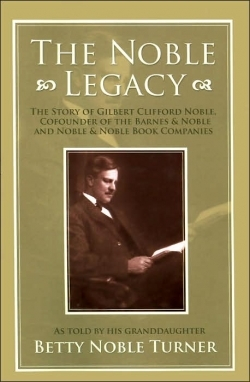The Noble Legacy
Former Texas mayor Betty Noble Turner has written an engaging biography of her grandfather, Gilbert Clifford Noble, one of the founders of the Barnes & Noble bookstore chain and Noble & Noble textbook publishers. In The Noble Legacy, she traces her ancestor’s rise from humble beginnings on a Massachusetts farm, his New York City years as a bookstore clerk in the dynamic 1880s and 1890s, and his grand successes in the publishing industry.
The reader learns that Noble’s devout farmer parents initially disapproved of their middle child’s intentions to attend college, but after a bit of persuasion, off to Harvard he went. Noble relished the intellectual atmosphere and used his collegiate contacts and expanded knowledge in his first job as a book clerk for Arthur Hinds and later in developing the textbook market for his own firms. His work for Hinds is the most vividly described section of the book. Noble was so impoverished, but also so persuasive, that he convinced his employer to let him live in a back room of the bookstore. Here he slept on the floor, washed in the sink, rode out the City’s historic three-day blizzard in 1887, and prepared for dates with his future wife Lizzie, whom he met after rescuing her from a runaway horse in Central Park.
Turner writes well, with a simple style that effectively captures the gentler times in which her forbear grew up. She includes many imagined conversations and thoughts to flesh out pivotal scenes in her grandfather’s life, and certainly her research benefited from access to family lore, conversations with other relatives, and correspondence that an outside biographer might not be able to access. The drawback to having a family member as her subject is that the book makes for tame reading. Noble is never described as having any faults, and when there are disputes with business partners, including his own sons, the scenes are only mentioned, never examined. Everyone’s lives have problems and every personality has its imperfections, but the author never deviates from describing her illustrious ancestor as a paragon of old-fashioned virtue. As such, the book resembles more of an extended eulogy than an examination of an interesting life.
The last third of the book is a somewhat tedious recitation of business mergers and acquisitions; some successful, some not. Though Noble is best known today as the second half of the famous Barnes and Noble booksellers, it may surprise the reader to learn that this business union was brief and the book spends little time elaborating on the details. Much more ink is devoted to describing the growth of Noble’s textbook and adult education publications and to his personal life.
Reviewed by
Rachel Jagareski
Disclosure: This article is not an endorsement, but a review. The publisher of this book provided free copies of the book and paid a small fee to have their book reviewed by a professional reviewer. Foreword Reviews and Clarion Reviews make no guarantee that the publisher will receive a positive review. Foreword Magazine, Inc. is disclosing this in accordance with the Federal Trade Commission’s 16 CFR, Part 255.

